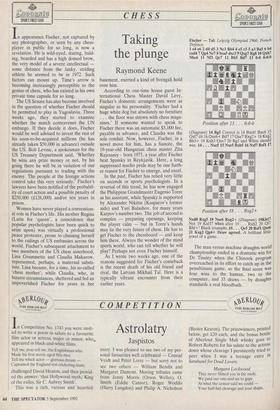Taking the plunge
Raymond Keene
In appearance Fischer, not captured by any photographer, or seen by any chess- player in public for so long, is now a revelation. He is wild-eyed, staring, bald- ing, bearded and has a high domed brow, the very model of a severe intellectual some distance from the lanky, striding athlete he seemed to be in 1972. Such factors can mount up. Time's arrow is becoming increasingly perceptible to the genius of chess, who has existed in his own private time capsule for so long.
The US Senate has also become involved in the question of whether Fischer should be permitted to play in Yugoslavia. Three weeks ago, they started to examine whether the match contravenes the UN embargo. If they decide it does, Fischer would be well advised to invest the rest of his soon-to-be-acquired millions (he has already taken $50,000 in advance) outside the US. Bob Levine, a spokesman for the US Treasury Department said, 'Whether he wins any prize money or not, by his going there he will be in violation of our regulations pursuant to trading with the enemy. The people at the foreign actions control take this very seriously.' Fischer's lawyers have been notified of the probabil- ity of court action and a possible penalty of $250,000 (£126,000) and/or ten years in prison.
Women have never played a convention- al role in Fischer's life. His mother Regina (Latin for 'queen', a coincidence that popular psychologists have been quick to seize upon) was virtually a professional peace protester, prone to chaining herself to the railings of US embassies across the world. Fischer's subsequent attachment to two members of the US chess sisterhood, Lina Grummette and Claudia Makarow, represented, perhaps, a maternal substi- tute. Lina became, for a time, his so-called `chess mother'; while Claudia, who, in bizarre circumstances, sheltered and fed an impoverished Fischer for years in her basement, exerted a kind of Svengali hold over him.
According to one-time house guest In- ternational Chess Master David Levy, Fischer's domestic arrangements were as singular as his personality. 'Fischer had a huge white dog but absolutely no furniture . . . the floor was strewn with chess maga- zines.' If someone wanted to speak to Fischer there was an automatic $5,000 fee, payable in advance, and Claudia was the sole conduit. Now, however, Fischer, in a novel move for him, has a fiancee, the 19-year-old Hungarian chess master Zita Rajcsaniy – born 1973, a year after Fischer beat Spassky in Reykjavik. Here, a long suppressed macho pride may be one furth- er reason for Fischer to emerge, and excel.
In the past, Fischer has relied very little on seconds or sports psychologists. In a reversal of this trend, he has now engaged the Philippine Grandmaster Eugenio Torre as his assistant, while Spassky is supported by Alexander Nikitin (Kasparov's former aide) and Yuri Balashov, for many years Karpov's number two. The job of second is complex — preparing openings, keeping the player calm — but in Torre's hands may lie the very future of chess. He has to get Fischer to the chessboard — and keep him there. Always the wonder of the mind sports world, who can tell whether he will play? Perhaps not even Fischer himself.
As I wrote two weeks ago, one of the reasons suggested for Fischer's comeback is the recent death of his old friend and rival, the Latvian Mikhail Tal. Here is a typically vibrant encounter from their earlier years. Fischer — Tal: Leipzig Olympiad 1960; French Defence. 1 e4 e6 2 d4 d5 3 Nc3 Bb4 4 e5 c5 5 a3 Ba5 6 b4 cxd4 7 Qg4 Ne7 8 bxa5 dxc3 9 Qxg7 Rg8 10 Qx117 Nbc6 11 Nf3 Qc7 12 Bb5 Bd7 13 0-0 0-0-0 Position after 13 . . . 0-0-0 (Diagram) 14 Bg5 Correct is 14 Bxc6! Bxc6 15 Qxf7 d4 16 Qxe6+ Bd7 17 Qxe7 Rxg2+ 18104.2 Bh3+ 19 Kxh3 Qxe7 20 Bg5 and White should win. 14 . . . NxeS 15 NxeS BxbS 16 Nxf7 Bxf1 17 Position after 18 . . . Rxg2+ Nxd8 RxgS 18 Nxe6 Rxg2+ (Diagram) 19Khl? Not 19 Kxfl? when after 19 . . . Rxh2 20 017 Rhl+! Black triumphs.19. . . Qe5 20 Rxf1 Qxe6 21 Kxg2 Qg4+ Draw agreed. A brilliant little jewel of a game.
The man versus machine draughts world championship ended in a dramatic win for Dr Tinsley when the Chinook program overreached in its effort to catch up in the penultimate game, so the final score was four wins to the human, two to the computer, and 33 draws — by draughts standards a real bloodbath.


















































 Previous page
Previous page